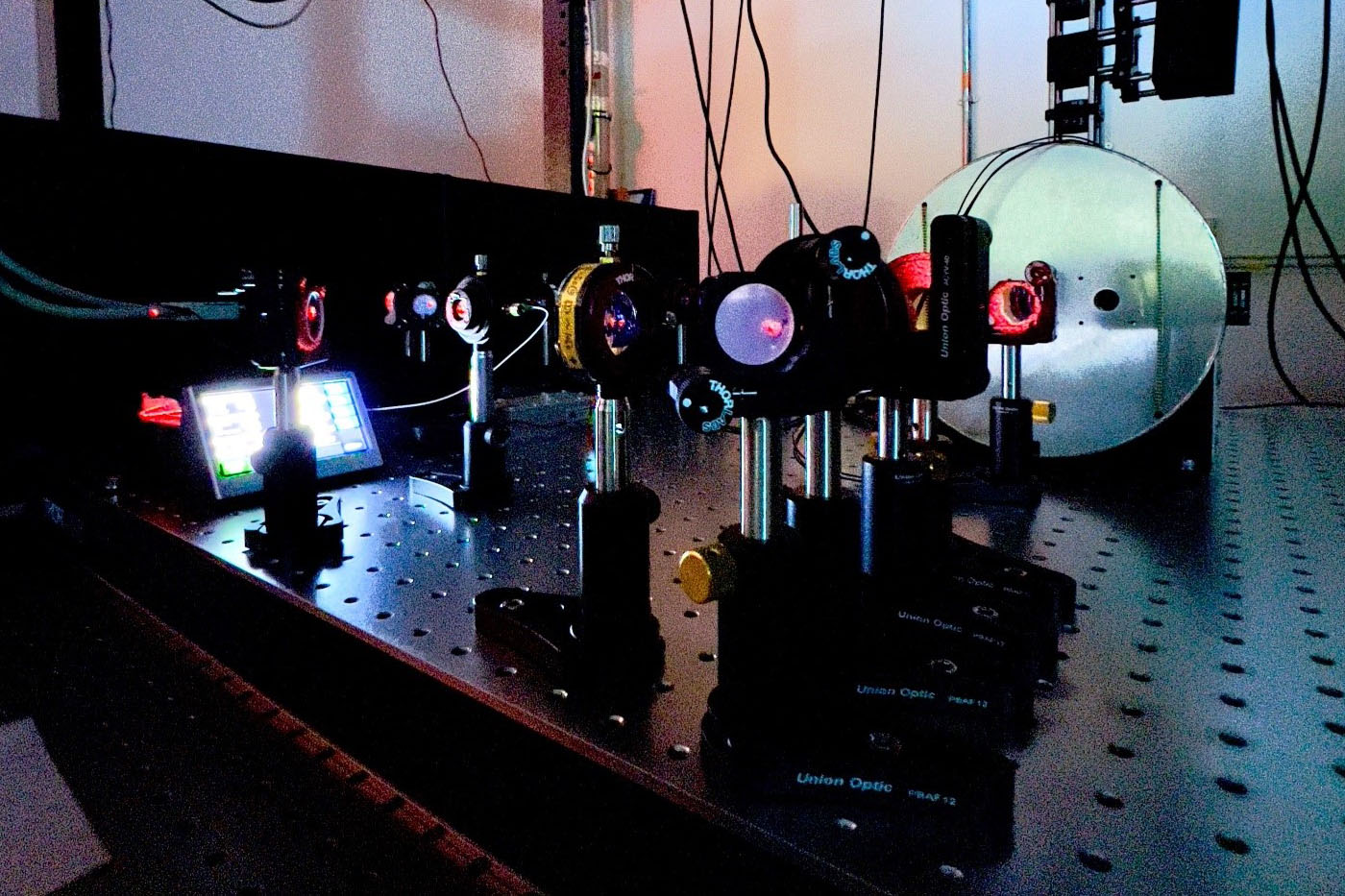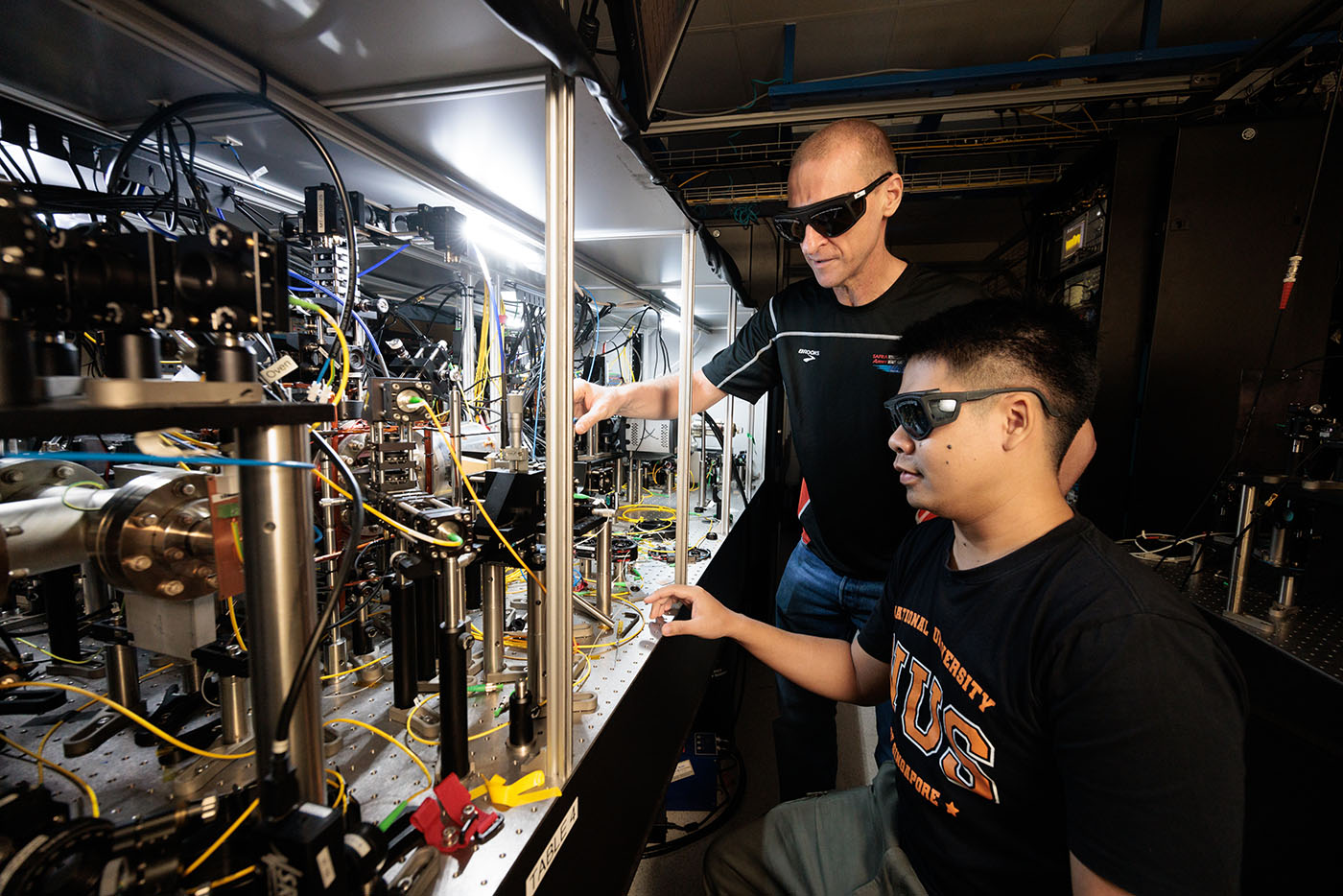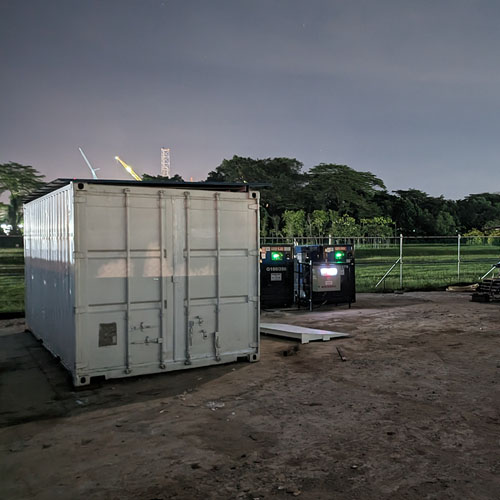Highlights
Singapore joins worldwide scientific network to search for exotic physics
 This precise quantum magnetometer at A*STAR will be used to detect pseudomagnetic fields potentially caused by dark matter, indicating its presence.
This precise quantum magnetometer at A*STAR will be used to detect pseudomagnetic fields potentially caused by dark matter, indicating its presence.
Singapore has joined the Global Network of Optical Magnetometers to search for Exotic physics (GNOME), an international scientific collaboration that hunts for signals of dark matter and other exotic astrophysical fields that may lie beyond the current boundaries of physics. Dark matter has long intrigued scientists as it, together with dark energy, is theorised to make up 95% of our universe. Its existence challenges the laws of physics as we know them.
Dark matter remains undetectable through conventional methods, making it exceptionally challenging to observe directly. However, its presence can be inferred through its gravitational effects on visible matter, or as proposed in some theories, through its magnetic field-like influence on atoms. GNOME consists of 15 stations located in some of the most prestigious research institutions around the world. By analysing the magnetic field signals collected from the quantum sensors across these stations, the collective data of the network could reveal any global “domain wall” moving through the Earth generated by dark matter, allowing scientists to uncover its presence.
The Singapore GNOME station will be hosted at the Agency for Science, Technology and Research (A*STAR), with contributions from the Centre for Quantum Technologies (CQT), the National University of Singapore (NUS), and Nanyang Technological University, Singapore (NTU Singapore). The station will consolidate A*STAR’s advanced quantum magnetometers with CQT’s cutting-edge atomic gravimeters and world-class atomic clocks located at NTU Singapore and NUS respectively, and enhanced with cloud computing and machine learning functions by Amazon Web Services (AWS) Singapore, to boost data collection and analysis. Combining these distinct but complementary quantum sensors into a unified "hybrid-sensor network” can broaden the range of dark matter and exotic particles detected. In addition, Singapore’s position near the equator is favourable in that it can amplify GNOME’s geographic coverage, improving the accuracy of detection and filtering out unwanted signals.
Associate Professor Murray Barrett, Principal Investigator at CQT and faculty member in the NUS Department of Physics, said “The unprecedented precision of optical clocks opens new scientific opportunities such as the search for new physics or possible dark matter models. My team’s lutetium clock project has established this capability in Singapore, and I am delighted for the opportunity to contribute to GNOME.”
Also contributing to GNOME is CQT Principal Investigator Rainer Dumke, whose group has built an atomic gravimeter. Rainer holds a joint appointment as Associate Professor at NTU Singapore.
 (From right) PhD student Nakarin Jayjong and Murray with their lutetium atomic clock. Lutetium's properties means that it makes for a stable, ultra-precise clock.
(From right) PhD student Nakarin Jayjong and Murray with their lutetium atomic clock. Lutetium's properties means that it makes for a stable, ultra-precise clock.
Singapore’s inclusion into this network of prestigious institutions will stand to promote knowledge exchange. The advanced quantum sensors and machine learning algorithms developed through this project also have the potential to drive innovations and generate economic impact across different fields, including biomedical imaging, navigation systems and sensor arrays for environmental monitoring.
Dr Wang Tao, Senior Quantum Scientist at A*STAR, who previously operated and optimised two other GNOME stations at the University of California, Berkeley, said “Joining GNOME marks an exciting new chapter for us. It was made possible through strong public-private partnerships with our local ecosystem collaborators, CQT and AWS Singapore. As part of GNOME, Singapore is well-positioned to advance the frontiers of quantum metrology and contribute to unravelling the astrophysical mystery of dark matter. We aim to deliver our first search data in 2025.”
Ms Elsie Tan, Country Manager, Worldwide Public Sector, at AWS Singapore, said “AWS democratises access to quantum technologies that are helping organisations tackle complex challenges and drive innovation across industries. We are proud to advance Singapore's national quantum initiative and support its entry into the prestigious global GNOME network, building on our ongoing collaborations with A*STAR to develop quantum cloud solutions and accelerate mainstream capabilities in the cloud.”
Professor Lam Ping Koy, A*STAR Chief Quantum Scientist and CQT Principal Investigator, said “This initiative brings together Singapore’s expertise in quantum metrology and machine learning to tackle fundamental physics challenges. It establishes Singapore as a major player in quantum sensing, highlighting our global role in harnessing quantum technologies to address significant scientific challenges.”
Selected media coverage:
- Quantum Zeitgeist: Singapore Joins Dark Matter Hunt
- Space Daily: Singapore joins Worldwide Scientific Network GNOME to explore dark matter and exotic physics
Learn more
Related Stories
 | Quantum gravimeter helps check what lies underground July 26 2023 |
Lutetium clock a contender to redefine the second August 01 2023 |






